
views
Selecting the Word

Choose a concept or idea. Pick a word that describes a concept or idea, such as “Feminism,” “Justice,” “Patriotism,” “Family,” or “Love.” These words are open enough for you to create your own definition based on experience and find sources to support your definition. You can also pick a concept like “Success,” “Friendship,” or “Faith.” Concepts like “Pain,” “Loss,” or “Death” are also good options.

Avoid concrete objects or things. Concrete objects like “pencil,” “ball,” or “shoe” can be difficult to use in a definition essay. You may not be able to say much about concrete objects or write about them in a deep or insightful way. You can try taking a concrete object and using a similar word to make it more open-ended. For example, the word “house” is concrete and obvious. But the word “home” is more open-ended and allows you to create your own definition of the word.

Select a word you are familiar with. Go for a word that you recognize or understand on a basic level. This will make writing the definition a bit easier. For example, you may choose a word like “success” because you are familiar with the word and feel you may have a lot to say about what it means to be successful or to feel success in your life.

Go for a word that can have a variety of meanings. Make sure the word you choose is multidimensional and can mean a lot of different things to different people. This will give you a lot of room to include your personal understanding of the word, as well as the interpretations of others. For example, you may choose a word like “pain” because you feel there are a variety of meanings for the word based on who you talk to and how they experience “pain” in their lives.
Defining the Word
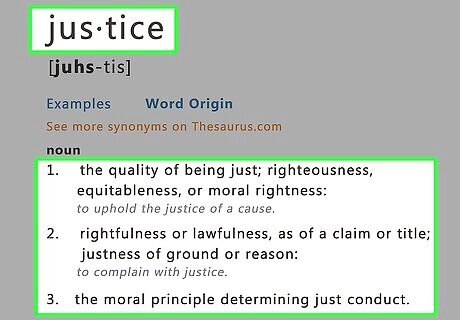
Look up the word in the dictionary. Start by familiarizing yourself with the official definition of the word. Use a dictionary to look up the word. Notice the structure of the definition, which will start with the term. It will then note the class of the term, which is where it belongs among other objects or concepts. Finally, it may note any synonyms, which are words that mean the same thing or are similar to the word. For example, if you look up the word “justice” in the dictionary, you may get this definition: “noun, the quality of being just; righteousness, equitableness, or moral rightness.” You can then determine that “justice” is a noun and can be compared to other terms like “righteousness” and “moral rightness.”

Research the origin of the word in encyclopedias. Find out where the word came from by looking it up online or in print encyclopedias. Search for the word in encyclopedias that focus on certain ideas or concepts, such as a philosophy encyclopedia or a law encyclopedia. Read up on any theories or ideas that connect to the word. For example, you may look up the word “justice” in an online encyclopedia that focuses on philosophy or law. You may then find information on Western theories of justice and how it became an important concept in Western history and the legal system.

Search online for articles, websites, and videos that discuss the word. You can also do a wide search for any scholarly or academic articles that discuss the word in detail. Look for academic websites that address the word, including articles, blog posts, or essays about the word. Look on academic search engines like Google Scholar, JSTOR, and ProQuest for scholarly articles. You can also look for educational videos that have been made about the word on YouTube and other video websites.

Interview peers, family, and friends about the word. Get a personal perspective on the word by talking to your family and friends about what they think about the word. Interview peers in your class or at work about what comes to mind when they hear or think about the word. You may ask them interview questions like: “What comes to mind when you think of the word?” “How do you feel about the word on a personal level?” “How do you interact or deal with the word?” “What does the word mean to you?” Take notes or record the interviews so you can use them as sources in your essay.
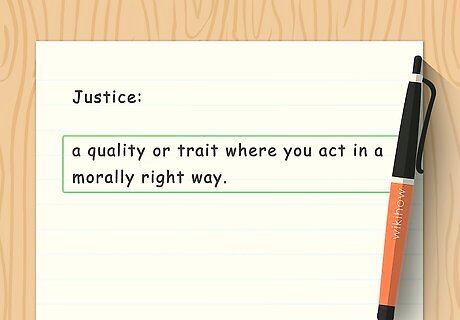
Create your own definition of the word. Use your research and your own experiences to write the definition. You may focus on how the word works in society or the world at large. You can also compare it to other similar terms. Format the definition by stating the word, followed by a one-sentence definition. For example, you may write: “Justice, a quality or trait where you act in a morally right way.” Or you may write: “Justice, a concept in the legal system where the fair or equitable thing is done, as in ‘justice has been served.’” It's important to have tact and tread carefully here. It's important to preface your own definition of the word, making it clear that's a personal opinion. Make sure not to create the misconception that your own definition is the accepted or official one. At the end of the day, your objective should be to write the actual definition, and not an opinion essay.
Creating an Essay Draft
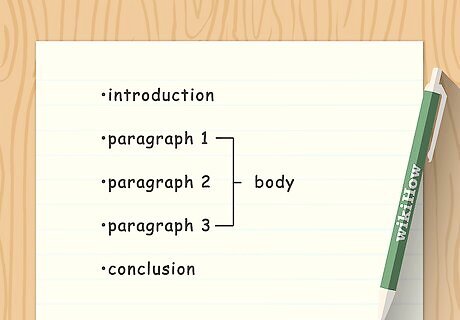
Use five sections for the essay. A typical definition essay will have five sections: an introduction, three body sections, and a conclusion. Ask your instructor if they require you to have one paragraph per section or if they are okay with you having as many paragraphs as you need per section. Your thesis statement should appear in the introduction and conclusion section of your essay.
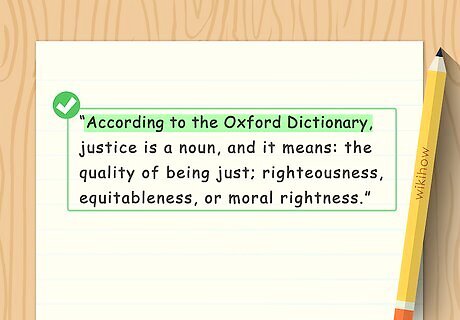
Introduce the term and the standard definition. Begin the essay by telling the reader the term you are defining. Then, provide the standard definition, using the dictionary and encyclopedias as references. For example, you may write, “According to the Oxford Dictionary, justice is a noun, and it means: the quality of being just; righteousness, equitableness, or moral rightness.”
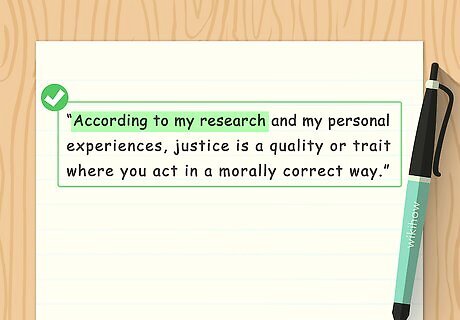
Include a thesis statement with your own definition. Include this in the first section of the essay. Your thesis statement should describe your version of what the term means. Mix in your personal experiences and your other research to create the definition. Keep the thesis statement one sentence long and use the active voice. For example, you may have a thesis statement like, “According to my research and my personal experiences, justice is a quality or trait where you act in a morally correct way.”
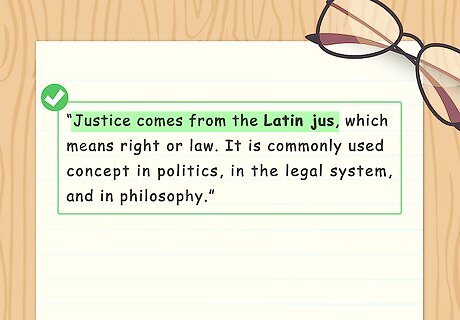
Discuss the history and origin of the word. In the second section of the essay, talk about where the word originated. Note the root of the word and how it came into use. Use your research, particularly your notes from encyclopedias and academic articles, as evidence. For example, you may write, “Justice comes from the Latin jus, which means right or law. It is a commonly used concept in politics, in the legal system, and in philosophy.”
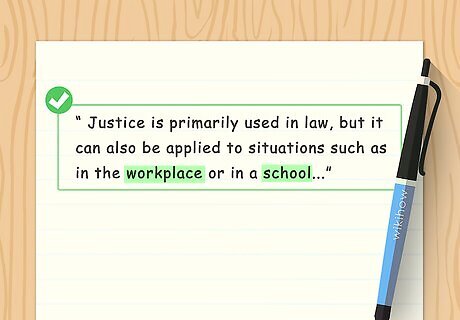
Analyze the dictionary definition of the word. In the third section, do a deep analysis of the dictionary definition of the term. Pull the definition apart and look at each word in the definition. Interpret and rephrase the definition so you can explore its deeper meanings. For example, you may discuss how justice works as a noun or an idea in politics, the legal system, and in philosophy. You may also discuss what the “quality of being just” means in our society.
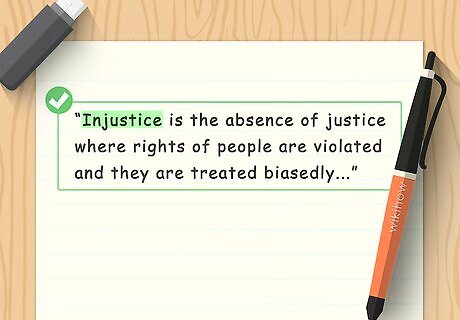
Compare and contrast the term with other terms. Compare the word to other words that are similar in meaning. Discuss how the word is similar and how it is different. For example, you may talk about how justice is similar and also not quite the same as words like “righteousness” and “equitableness.” You can also discuss words that mean the opposite of the term you are defining. For example, you may contrast the word “justice” with the word “injustice” or “inequality.”
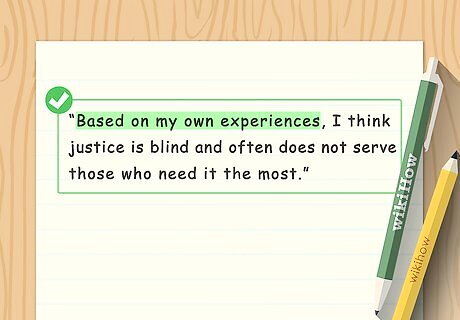
Discuss your personal definition. In the fourth section of the essay, you should include your perspective on the term as well as the perspectives of others. Describe the word based on your own personal experiences, such as a memory from childhood or an experience at school. For example, you may write, “On a personal level, I view justice as an essential concept” or “Based on my own experiences, I think justice is blind and often does not serve those who need it the most.” You can also include personal experiences of the word based on interviews you conducted with others.
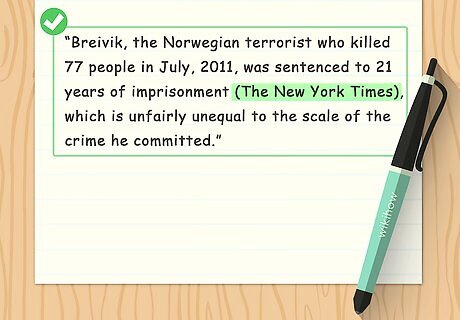
Support your points with evidence and references. Include quotes from your sources to back up your claims. Use quotes from articles, journals, and online resources. You can also include quotes from interviews you conducted to get personal definitions of the word. Make sure you follow your instructor’s preferred citation style, such as MLA, APA, or Chicago Style.
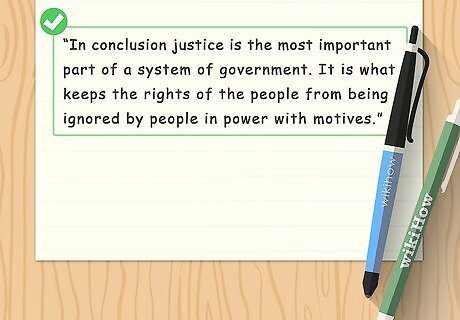
Conclude by restating your main points. Wrap up the essay in the last section by briefly restating the standard definition of the word. Then, restate your thesis statement so the reader is reminded of your personal definition of the word. Make sure the conclusion discusses only points you have made in the essay and does not introduce any new ideas or thoughts. Look at the first sentence in each section of the paragraph to help you gather your main points. Include a last sentence that has a strong image or that describes a key phrase in your essay.
Polishing the Essay

Read the essay out loud. Once you have completed a draft of the essay, read it aloud and listen to how it sounds on the page. Make sure each sentence flows well and that each section is well developed. Underline any awkward lines or phrases so you can revise them. You should also check for any spelling, grammar, or punctuation errors in the essay.

Show the essay to others for feedback. Get friends, peers, and family members to read the essay. Ask them if your definition of the word is clear and easy to follow. Pose questions about whether your points seem well supported and well developed in the essay. Be open to constructive criticism from others and take their feedback to heart. It will only make your essay better.

Revise the essay. Once you have gotten feedback on the essay, take the time to revise it for clarity and flow. Remove any sentences that are redundant or unclear. Make sure all your references and sources are properly cited. If there is a word count or a page count for the definition essay, make sure you meet it. Include a reference page at the end of the essay and a cover page at the beginning of the essay, if required.




















Comments
0 comment